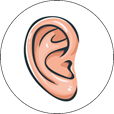Autism Spectrum Disorders (ASD) are defined clinically by impairment in communication, social interaction, behavioural flexibility and how a child responds to sensory stimuli. It is a spectrum which means that the behaviours seen can be very different from one person to the next. Individuals with ASD often present with mixed patterns of responsivity to sensory inputs. That is over-responsive to some sensory systems and under-responsive in other sensory systems. Individuals with ASD can present with sensory processing difficulties ranging from extreme sensory sensitivities to complete lack of responsiveness to sensory inputs. Poor sensory processing may affect the child’s participation in daily occupations such as self-care activities and occupational roles such as, play and learning. Many children with ASD can also demonstrate difficulties with ideation praxis which is important for self-initiated play and as a result they can prefer known tasks and routine.
Exploring our senses
Sensory processing difficulties can be evident in a range of conditions such as Autism Spectrum Disorder (ASD), Learning Disability, Neurological disabilities, Developmental Co-ordination Disorder (DCD), Attention Deficit Hyperactivity Disorder (ADHD) and Global Developmental Delay. However, Sensory Processing difficulties can also be seen in children, young people and adults without a formal diagnosis. Sensory difficulties may affect behaviour, movement, co-ordination and concentration, and have a big impact on self-esteem which can in turn impact on their participation in their activities of daily living, education, learning and play.
Hyperactivity and impulsivity can be symptoms of Sensory Processing difficulties as well as ADHD. About 15% of children have sensory processing difficulties. Those with ADHD or other neurodevelopmental disorders are more likely to exhibit signs of sensory overload than those without these conditions. A child with sensory overload may react by throwing a temper tantrum, screaming, crying, kicking, or trying to hide.
A person with sensory processing difficulties can be oversensitive or unresponsive to sound, touch, taste, sight, and/or smell. Effective processing of sensory information as it is received can be challenging and this can be even more challenging for a child with a learning difficulty. We have to learn how to filter out what information is important and what information to ignore and some children struggle with this filtering process. Challenging behaviour can have a sensory based cause and can also increase with secondary gains i.e. to avoid a task or gain increased sensory input with physical moving and handling.
If you feel your child has severe and longstanding sensory processing difficulties that are having a direct impact on their ability to cope with their environment and daily activities, please discuss this with your GP, School or other Health Professional. The resources on this website are designed to be used and tried before a referral to the Sensory Processing Service will be considered.








